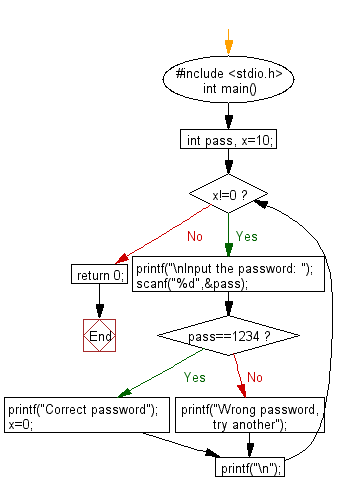C Exercises: Check the password until it is correct
C Basic Declarations and Expressions: Exercise-36 with Solution
Write a C program to read a password until it is correct. For wrong password print "Incorrect password" and for correct password print "Correct password" and quit the program. The correct password is 1234.
C Code:
#include <stdio.h>
int main() {
int pass, x=10;
while (x!=0)
{
printf("\nInput the password: ");
scanf("%d",&pass);
if (pass==1234)
{
printf("Correct password");
x=0;
}
else
{
printf("Wrong password, try another");
}
printf("\n");
}
return 0;
}
Sample Output:
Input the password: 1234 Correct password
Flowchart:

C Programming Code Editor:
Contribute your code and comments through Disqus.
Previous: Write a C program to check if two numbers in a pair is in ascending order or descending order.
Next: Write a C program to read the coordinate(x, y) (in Cartesian system) and find the quadrant to which it belongs (Quadrant -I, Quadrant -II, Quadrant -III, Quadrant -IV).
What is the difficulty level of this exercise?
Test your Programming skills with w3resource's quiz.
C Programming: Tips of the Day
Static variable inside of a function in C
The scope of variable is where the variable name can be seen. Here, x is visible only inside function foo().
The lifetime of a variable is the period over which it exists. If x were defined without the keyword static, the lifetime would be from the entry into foo() to the return from foo(); so it would be re-initialized to 5 on every call.
The keyword static acts to extend the lifetime of a variable to the lifetime of the programme; e.g. initialization occurs once and once only and then the variable retains its value - whatever it has come to be - over all future calls to foo().
Ref : https://bit.ly/3fOq7XP
- New Content published on w3resource:
- HTML-CSS Practical: Exercises, Practice, Solution
- Java Regular Expression: Exercises, Practice, Solution
- Scala Programming Exercises, Practice, Solution
- Python Itertools exercises
- Python Numpy exercises
- Python GeoPy Package exercises
- Python Pandas exercises
- Python nltk exercises
- Python BeautifulSoup exercises
- Form Template
- Composer - PHP Package Manager
- PHPUnit - PHP Testing
- Laravel - PHP Framework
- Angular - JavaScript Framework
- Vue - JavaScript Framework
- Jest - JavaScript Testing Framework
